

• LU REHAB COUNSELING CELEBRATES 25 YEARS 3
• TCC2LU INCREASES OPPORTUNITIES 6
• PERSEVERANCE: THE STORY OF DR. HERRON 10
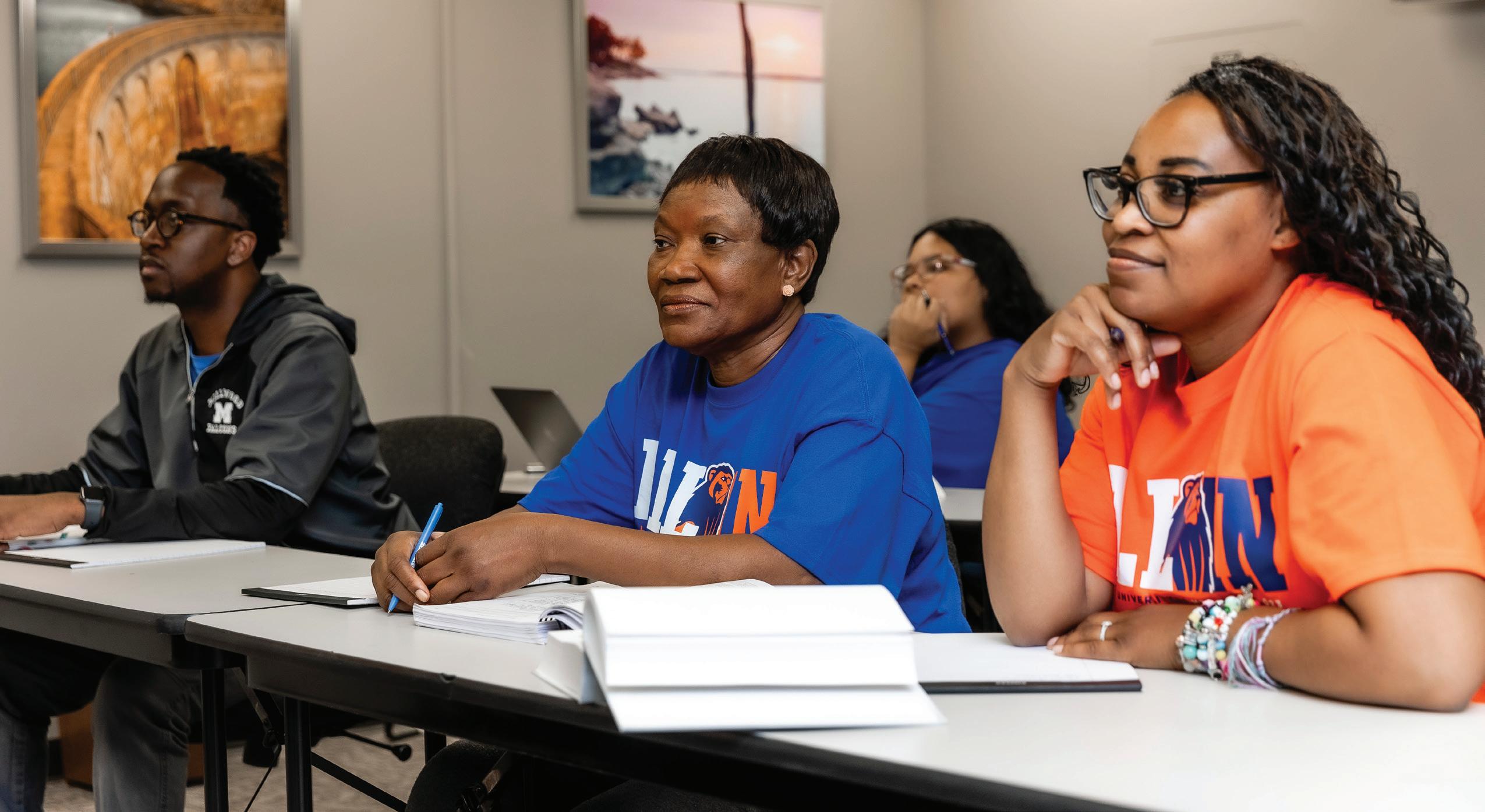
BY ELLIE MELERO



• LU REHAB COUNSELING CELEBRATES 25 YEARS 3
• TCC2LU INCREASES OPPORTUNITIES 6
• PERSEVERANCE: THE STORY OF DR. HERRON 10

BY ELLIE MELERO
It was a normal fall day in Oklahoma City, and Terrance Grayson was feeling restless. He had called in sick to work that morning, but he wasn’t physically ill. He was just sick of his job.
Grayson had been working for the same financial lending company since graduating college, and he was good at his job. He had risen quickly to a managerial position and was making good money, but he hated the work. He wanted to do something different with his life. He wanted a career that felt fulfilling and where he could help others. He just wasn't sure what that career was.
That day, he told himself that because he hadn’t gone to work, he needed to find something productive to do. He decided to go for a walk. While strolling down the street, he saw a sign for Langston University and made an impulse decision to walk inside. At the front desk, Grayson asked what graduate programs they had available, and that’s when he learned about LU’s brand new master’s degree in Rehabilitation Counseling.
“I just walked up to Langston (University) and asked them if they had any programs,” Grayson said. “I literally walked in off
the street and met with Dr. Moore, and I talked with him about it and filled out an application and just started down that path.” That was in 2000. Grayson was part of the inaugural class for the Rehabilitation Counseling master’s program. Now, he has been working for Rose State College in Midwest City, Oklahoma, for almost two decades, and he loves his job.
The Rehabilitation Counseling master’s program came together as the result of a partnership between LU and the Oklahoma Department of Rehabilitation Services. The two institutions collaborated on a grant proposal for the U.S. Department of Education’s Rehabilitation Services Administration and were awarded $500,000 to hire faculty, fund student scholarships and fund student conference travel.
Dr. Corey Moore was hired in October 2000 to create the program, and he became the Founding Director. Dr. Moore came from the University of Arkansas–Fayetteville’s Rehabilitation Research and Training Center on Persons who are Deaf and Hard-of-Hearing, where he served as a research assistant professor. His experience and expertise have shaped the LU program for the past 25 years.
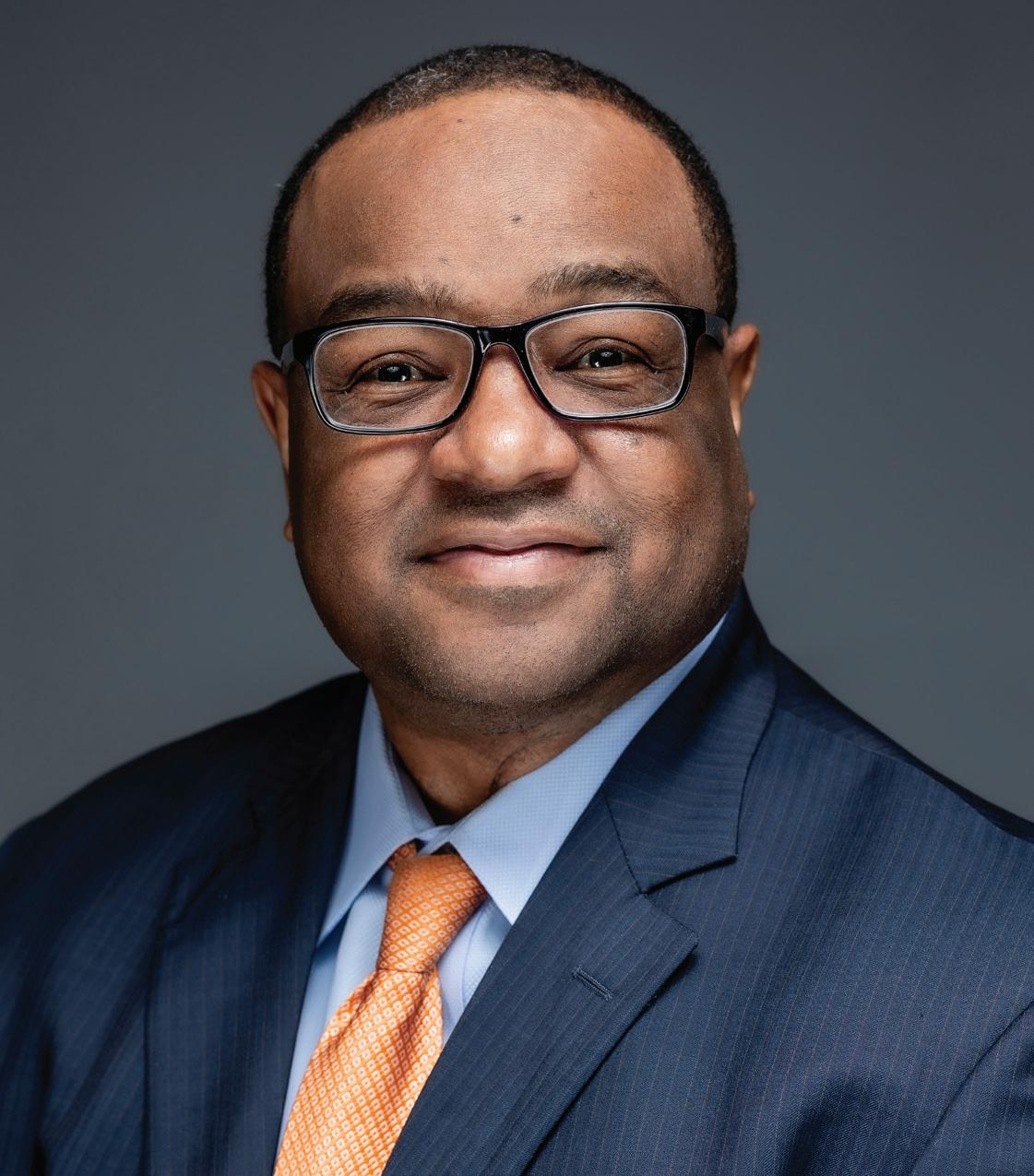
“I saw the mission of the graduate program in rehabilitation counseling as to train rehabilitation and mental health professionals to meet the needs of people with disabilities,” Dr. Moore said. “Teaching, research and service.”
For months, Dr. Moore worked to recruit faculty and students while putting together a curriculum worthy of accreditation. In Spring 2001, the program officially launched at the LUOklahoma City campus with its first cohort of 18 students.
Alongside Grayson, Sharon Caldwell was a member of that inaugural class.
Caldwell was a graduating senior in LU’s Health, Physical Education and Recreation program when she first heard about vocational rehabilitation counseling. She had originally come to LU with the goal of becoming a physical therapist, but as she approached graduation, she was no longer sure that’s what she wanted. At her professor’s recommendation, she decided to attend an information session about the new Rehabilitation Counseling program.
“Initially, when I went to Langston, I felt like my passion was physical therapy because I knew I wanted to help people in some type of way,” Caldwell said.“When I heard about the rehab counseling program, those individuals work with individuals with disabilities to help them... to make them become more independent. The fact that the vocational rehab counselor was helping individuals achieve something, I think that kind of
sparked my attention.”
Grayson and Caldwell were excited about the program and the opportunities it offered them.With his scholarship, Grayson was able to quit the job he hated and focus on school full time. As she progressed through her classes, Caldwell discovered a clearer path to her future.
Their cohort became close friends during school. They joked they were “the guinea pig class” because the program was still trying to determine the best ways to do things, but the students knew they were still getting a quality education. They liked working with one another, they liked their professors and, even while working for hours on research papers, they were having fun learning.
“I’d say, educationally, it was the best experience I’ve ever had,” Grayson said. “They opened all these doors to me and provided me with all the support, and without that, I’m not sure I would’ve been able to do it... The environment was just so nurturing that it was everything I needed at the time.”
All 18 members of the first cohort graduated from the program on time and found work in the counseling industry. Grayson worked for the Oklahoma Department of Rehabilitation Services for almost three years before he began working at Rose State. He has held various positions there, and he is now the Director of Academic Outreach.

Caldwell completed an internship/practicum with one of her professors at PROS and Associates during school, and she accepted a full-time position there after graduation. She worked as a rehabilitation counselor for three institutions before accepting a position as a counselor with the U.S. Department of Veterans Affairs in 2012. Since then, she has worked in the Veterans Readiness & Employment Program in Oklahoma City, and she is now the Employment Coordinator.
The first few cohorts that went through the Rehabilitation Counseling program were so successful, the university decided to expand the program in 2004 and offer the master’s degree at the LU-Tulsa campus, too. In 2008, LU-Tulsa added a bachelor’s in Rehabilitation Services, and the School of Education and Behavioral Sciences officially created the Department of Rehabilitation and Disability Studies with Dr. Moore as the Founding Chair.
The Rehabilitation Counseling program earned its accreditation through the Council for Accreditation of Counselors and Related Educational Programs. In 2013 the Department of Rehabilitation and Disability Studies established LU’s first Rehabilitation and Research Training Center (RRTC) that conducts research on capacity building for minorities. A second RRTC has since been established that conducts research on advancing employment opportunities for people with disabilities with the greatest support needs.
The RRTCs are nationally recognized and funded by the National Institute on Disability, Independent Living and Rehabilitation Research. Through the RRTC, the Department of Rehabilitation and Disability Studies established a postdoctoral program for recent doctoral graduates to train in advanced research methodology and statistics. The RRTC has hosted seven doctoral fellows over the past eight years, all of whom have gone on to work at other universities, federal agencies or community-based rehabilitation service programs.
All of this grew from the master’s degree.
While they celebrate this milestone anniversary for the Rehabilitation Studies graduate program, Dr. Moore and the faculty in the Department of Rehabilitation and Disabilities Studies continue to look for ways to improve and grow the program. They are focused on workforce needs. They try to listen to their community and be responsive to the demands of employers. They have created an informed and research-based curriculum that prepares graduates for the demands of a career as a vocational rehabilitation counselor.
“It’s been 25 years of joy and just a remarkable journey,” Dr. Moore said. “I’m excited about that, happy about that, thankful for it. We look forward to continuing to push the program forward in the future, and I think great things are beyond the horizon.”
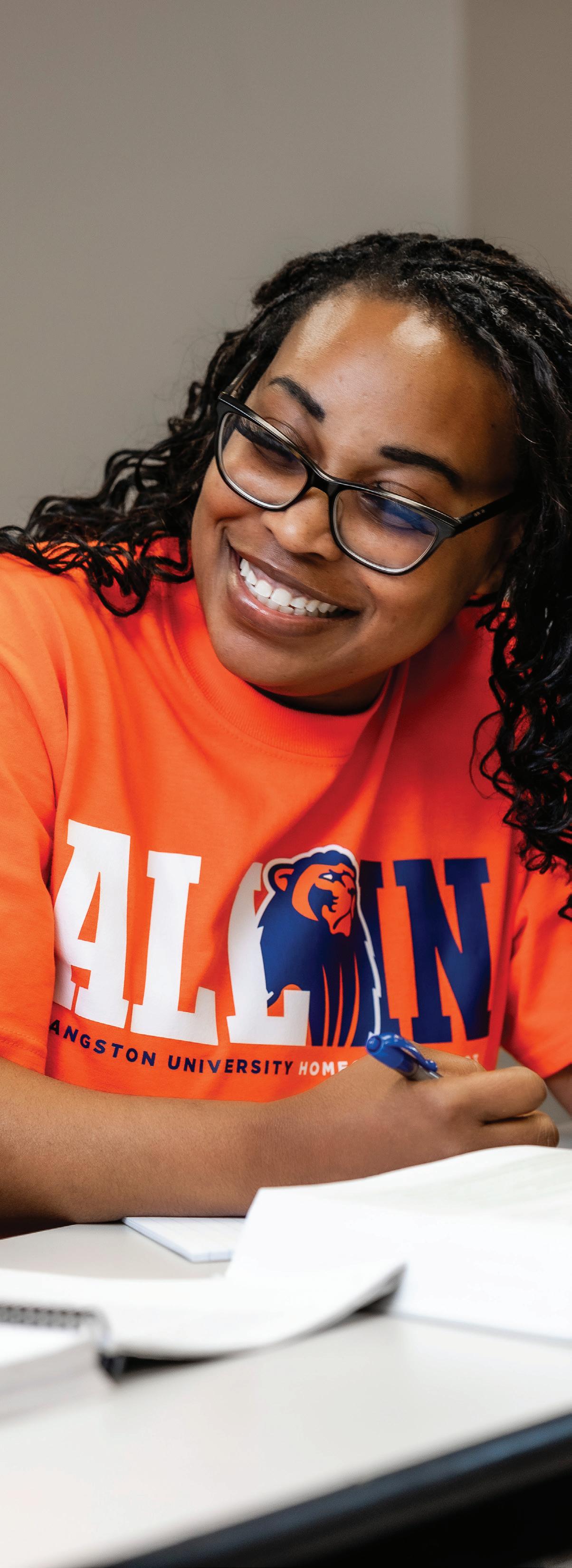
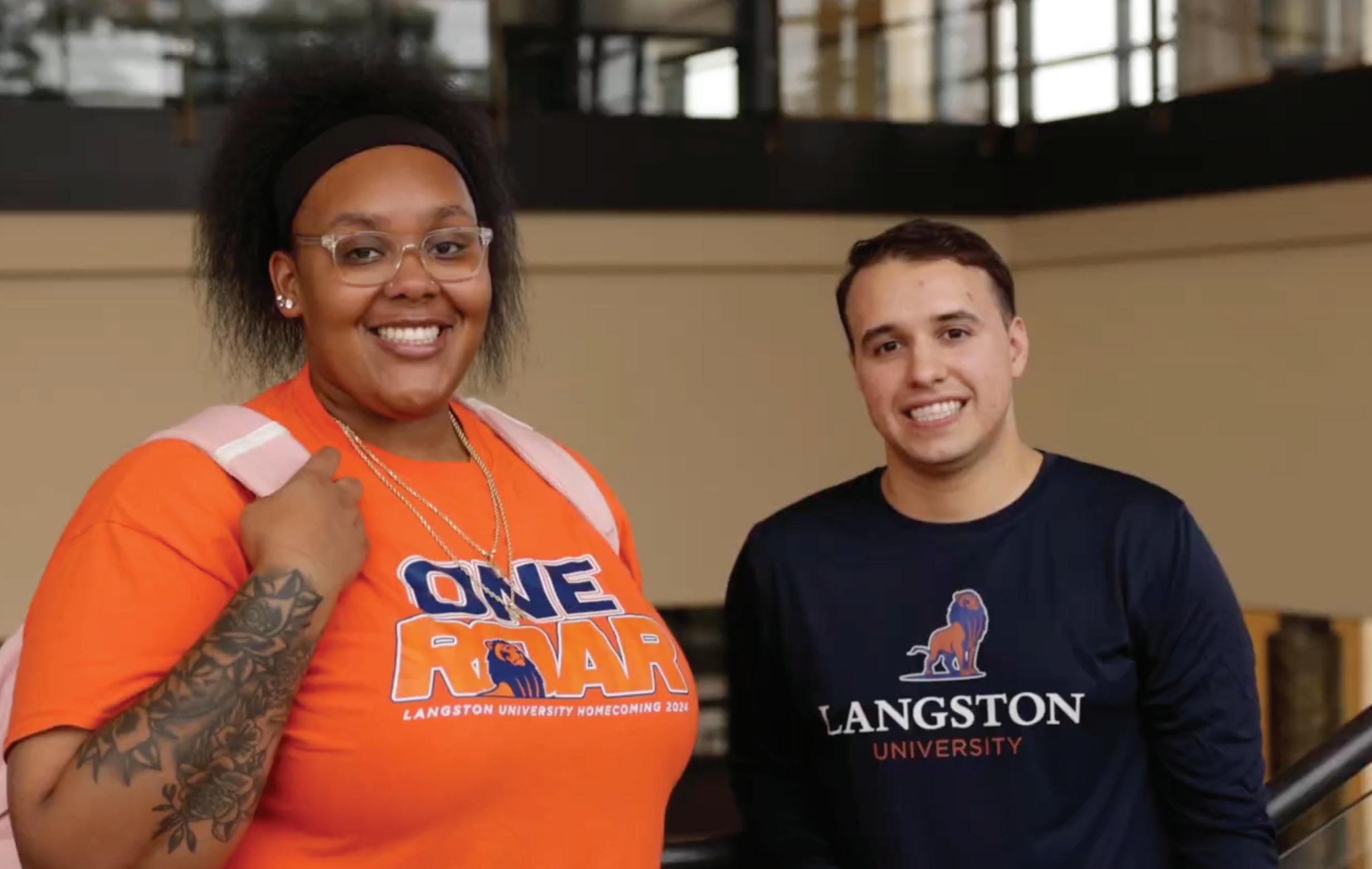
BY ELLIE MELERO
For members of Oklahoma's Hispanic community, access to mental health services can often be difficult to find. In addition to addressing their mental health, Hispanic patients need help navigating cultural stigmas as well as language barriers that can often arise with medical terminology, and not all providers are equipped to assist in these areas.
Pedro Muñoz knows he can help.
Muñoz is a graduate student in Langston University’s rehabilitation counseling master’s program in Tulsa. He wants to become a bilingual licensed professional counselor within the Hispanic community, and he’s well on his way to achieving this goal. He hasn’t been on this journey alone, though.
Muñoz transferred into LU’s rehabilitation services bachelor’s degree program after earning his associate’s degree in psychology at Tulsa Community College (TCC). He continued straight into the master’s program after graduation. Thanks to the mentorship of his professors and the support of his peers, he’s more motivated than ever to pursue his dream of becoming a bilingual counselor.
“(LU and TCC have) helped me gain valuable skills,” Muñoz said. “Professional and academic skills that otherwise, I wouldn't have been able to gain on my own.”
Langston University is one of TCC’s University Transfer Partners through the Tulsa Higher Education Consortium. The TCC2LU transfer pathway provides a smooth transition for students as they go from community college to a traditional 4-year university. Advisors from both institutions work together to map a clear path for students so they are ready to jump into their upper-level classes as soon as they get to LU.
For nursing student Carissa Hemphill, that smooth transition was essential.
Hemphill is a working mother of four. She didn’t have the time or money to waste on a bumpy transition. She had heard horror stories about students who tried to transfer to other universities who either had to retake classes when they arrived or who weren’t informed they didn’t have all their prerequisites until they were already there.
She had never heard of people having those issues at LU, though, so she decided to look into their Bachelor of Science in Nursing (BSN) program. Her LU advisor was transparent with her from the beginning about the hard work it would take to earn her BSN, and she helped Hemphill map out what classes she still needed to take at TCC so she could apply on time and be ready to start her nursing classes right away.
“I wanted a program where I already had all my (prerequisite) classes done so I just could do my program,” Hemphill said. “I didn’t want to waste my time, my money, none of it.”
Hemphill transferred to LU-Tulsa's BSN program in 2024 without any hiccups, and she has already learned a lot from the program. Fellow nursing student D'Ajuania Barnes has also had a positive experience since transferring from TCC.
Barnes grew up supporting Langston University because many of her family members attended LU, but when she graduated high school, she wasn’t quite ready to become a Lion.
TCC was the perfect choice for her because of its affordability and its smaller class sizes. It allowed her to transition from high school to college at her own pace, preparing her for the rigor of the coursework she would experience at LU.
Barnes decided to transfer to LU-Tulsa for her BSN because the program had a good reputation, high ranking and was affordable. Thanks to her LU and TCC advisors, her transfer experience was seamless, and she was ready to dive into her nursing classes once she got to campus.
Students interested in transferring from Tulsa Community College to Langston University upon the completion of their associate degree can do so seamlessly, with all hours counting toward bachelor's degree completion, with the help of the TCC2LU Transfer Map. You’ll work with an LU advisor alongside your TCC advisor to ensure you are getting the maximum value out of your time and dollars to make transferring as easy as possible. Students may connect with a Langston University representative via the TCC Transfer Center to learn more about academic programs, transfer, tuition and other student resources.

“I didn’t have to do much because my advisors had already talked and had everything mapped out for me,” Barnes said.
“I knew I had to take three extra classes, and they got me enrolled in those really quick. I took them over the summer, and we were ready to transfer and be in here by August. It was a good, easy transfer."
Barnes and Hemphill both love the LU-Tulsa BSN program.
The degree is structured so the students complete the program as a cohort, taking all their classes together each semester. They often decide to study with one another outside of class, too, and become tight-knit friend groups. Hemphill said her cohort jokes they will all have to find jobs together after graduation because they can no longer be apart.
Although their classes are tough, both Barnes and Hemphill can tell their professors want to see them succeed. Their professors and advisors are supportive and always available to talk withto students when they need help.
“They are preparing me for a stressful career because they like to stress us out,” Hemphill laughed. “But I do feel like

they are preparing us for what’s ahead. The program so far and the professors that I’ve had, I’ve loved them. They’re great, they’re helpful, they’re hard, but it’s to prepare us. We need to know this stuff, so I respect that.”
For Barnes, part of what makes LU-Tulsa great are the experiences they get to have outside of their classes, too.
Although LU-Tulsa is an urban campus, they still participate in university-wide events like Homecoming. They also host plenty of their own community outreach events, giving students an opportunity to meet and interact with new people from all over Tulsa.
For Muñoz, that sense of community is one of the best parts about LU-Tulsa.
Like Barnes, Muñoz chose to start his academic journey at TCC because of its affordability. It was a way for him to begin working on a degree while he was still figuring out exactly what he wanted to do.
He originally planned to pursue a bachelor’s degree in psychology after his time at TCC until he met Dr. John Sassin at a TCC southeast campus event. Dr. Sassin, a professor in LU’s Rehabilitation Counseling program, told Muñoz all about the program and even helped him work out a potential plan of study to consider. Muñoz did consider it, and when he later researched LU-Tulsa, he knew that was where he needed to go.
“It’s one of the best programs in the state,” Muñoz said. “You’re getting a very good, accredited program for the price.”
He transferred to LU-Tulsa in 2022 and immediately felt at home. As with the nursing program, the rehabilitation counseling student cohort became its own little family, and Muñoz became motivated to dive into his studies thanks to the encouragement of his peers and professors.
He never imagined he would want to pursue a master’s degree, but after two years at LU-Tulsa, he knew there was still more he wanted to learn. Thanks to Langston University, Muñoz is pursuing his dream of becoming a licensed professional counselor for the Hispanic community.
“One of the biggest highlights for me here at Langston (University) is getting to be so involved and being so passionate about counseling that it’s really opened up not only doors and
opportunities, but also the desire to continue and to study and to achieve higher education,” Muñoz said.
It may not have been a traditional college experience, but Muñoz, Hemphill and Barnes have no regrets about starting their educational journeys at TCC and transferring to Langston University.
Muñoz said he would encourage people to consider LU-Tulsa because of its welcoming and supportive environment. Hemphill said she would advise students considering transferring from TCC to talk to their advisors as soon as possible. Barnes said she would encourage others to consider the TCC2LU transfer pathway because it’s an affordable path with a quality education.
“I’m so thankful I got to start out at TCC and go to Langston because it’s helped me be able to save money and learn responsibility,” Barnes said. “(LU) wants to see all their students succeed, so they do what it takes to help us. It’s very affordable, and everybody here is helpful."

Langston University’s Tulsa campus strives to provide the best educational experience for Tulsa residents and beyond. LU-Tulsa's Jack Henderson Allied Health Building is a testament to that commitment. This state-of-the-art facility includes simulation labs with mannikins powered by artificial intelligence, spacious classrooms, a lecture hall, conference and meeting rooms, and department and administrative office spaces. This equipment and space provides our students with experiences and hands-on learning opportunities that prepare them for the future of healthcare.
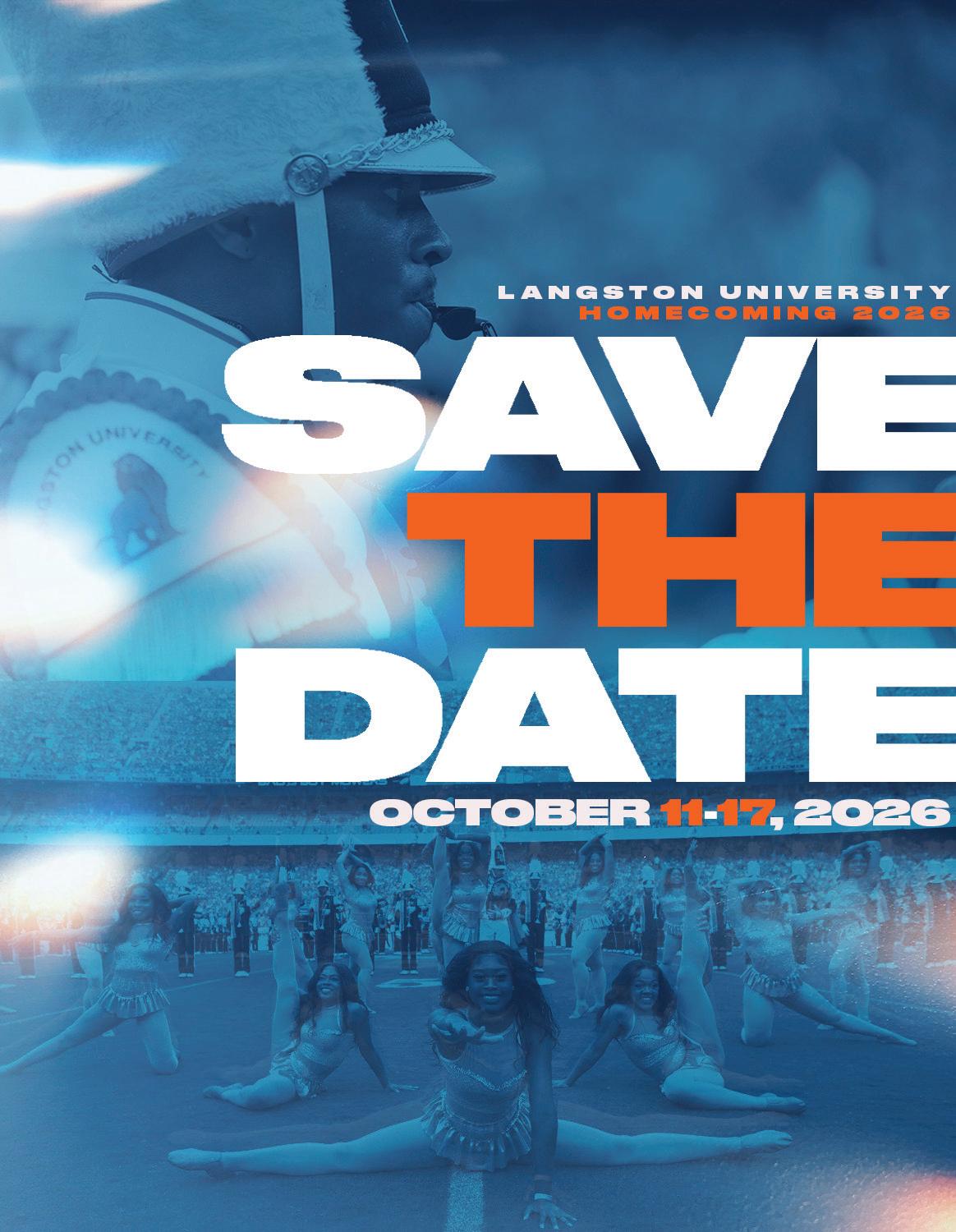

BY ELLIE MELERO
Standing at the front of the classroom on a Wednesday evening, Dr. Ruben Herron knows he’s exactly where he’s supposed to be.
As he leads the room of graduate students in an energetic discussion about client-provider dynamics in rehabilitation counseling, it’s hard to imagine there was a time when he felt like he didn’t have a calling. But for most of his early adulthood, Dr. Herron struggled to find his place in the world.
Throughout his 20s and 30s, Dr. Herron tried his hand at several careers, but he could never find a job where he felt truly fulfilled.Years of trial and error in various fields eventually brought him to Langston University to study rehabilitation counseling, and a chance opportunity years later brought him back to LU to teach. Now, he knows there were always a perfect career out there for him.
He just had to find it.
Ruben Herron moved around a lot when he was a kid.
His family was from El Paso, Texas, but his dad was in the Army. As they accompanied him to each new duty station, the Herrons lived in places like Germany and England before eventually making their way to Wichita Falls, Texas.
When Herron graduated high school, his father offered to pay for him to attend the local community college, but Herron didn’t want to go to school. He decided to enlist in the Marine Corps instead, and he spent a year in California at Camp Pendleton before he got out and moved back to Wichita Falls.
He returned to Texas during the 1980s “oil glut,” and work was hard to find. He took his dad up on his offer to pay for community college, but Herron wasn’t a good student and soon dropped out. He got a job doing manual labor at a pipe yard until one Monday, he came to work to find out he’d been laid off.
“Suddenly, we all got pink slips,” Herron said. “And then there were no jobs in Wichita Falls because the big factory shut down. I mean, everybody was getting laid off.”
Herron and his wife decided it was time to leave Texas, so they moved to Tulsa, where his wife’s aunt lived. They arrived in two cars with three kids and a dog, and they were disappointed to find the job market wasn’t much better than it had been in Wichita Falls. Regardless, Herron was determined to provide for his family, and he finally found a part-time job as a sanitation worker.
It was hard, dirty and exhausting work, but Herron persevered. Eventually, he left the trash company for a job at Climate
Control. He did his best to provide for his wife and kids, and he was grateful to receive government assistance during those days.
In the late ‘80s, Herron finally felt like he had a breakthrough. He found a new job as a maintenance man for an apartment complex, and he and his family moved out of government housing. For the first time in a while, they even had some money left over after their bills.
“They paid part of our rent at the apartment complex we was working at, and I was able to pick up a lot of overtime,” Herron said. “And so, we started to move up the ladder a little bit.”
During this time, Herron felt like he was starting to understand the importance of school. A better education could lead to a better job, and Herron wanted a better job. He and his wife decided to start taking classes at Tulsa Community College (TCC) together in bits and pieces as they could afford it.
Despite their improved circumstances, Herron’s success was short lived.
He felt dissatisfied with his life, and he began facing mental health issues. He sought out unhealthy coping mechanisms, and he ended up getting fired from his job. His marriage suffered because of it, and his wife left him.
Herron fell into a depression. He felt angry, hurt and frustrated, and he didn’t know what to do. He found himself involved in illegal activities, which led him to spend two and a half years in a correctional facility.
“Because of my own stubbornness, my own ignorance, my own selfishness, I chose the path I chose,” Herron said regretfully.
He felt like he had hit rock bottom, and he still has a lot of emotions to process when he thinks about that time. But he soon discovered the only thing to do was keep moving forward.
When he was released from the correctional facility, Herron was determined not to go back.
He began working at Bennett Steel Inc. as a sandblaster, a job he thoroughly enjoyed because of how peaceful and almost meditative it was. He earned good money, and he felt like he was starting to move up in the world again. Most importantly, at Bennet Steel, Herron met a man who would help him change his life: the company’s owner, Dave Bennett.
Bennett was a great boss. He cared about his employees’ wellbeing, and he became a mentor for Herron. It meant a lot to him to have someone looking out for him. But as time went
on, Herron found himself becoming restless again.
He liked his job and his boss, but he was still dealing with mental health issues. He still felt dissatisfied with his life. He began acting out in small ways, and Bennett noticed immediately.
Bennett wasn’t about to let Herron slip into old habits, so he convinced Herron to see a counselor.
“Through Dave Bennett’s help, I went and started seeing a counselor, which was really, really, really transformative,” Herron said. “She made me go there with myself, but she sort of held my hand. Like, ‘You know this is what you want.You know you want to let it out. Let it out. Trust yourself.’ And that was the biggest process.”
Counseling changed Herron’s life, and he found a kinder, softer version of himself. He learned how to take care of his mental health and how to cope with negative thoughts. He became someone he liked to be.
He continued to see the counselor while he worked at Bennett Steel, but the feelings of restlessness and dissatisfaction never went away completely. Once, he was having a particularly bad day when Bennett walked in, and he realized what he needed to do.
“Dave Bennett walks in, and I said, ‘Dave, will you loan me $375 bucks so I can go back to TCC?’” Herron said. “And he reached in his pocket and said, ‘Yeah.’ So that’s how I started back at TCC.”
In 2001, Herron went back to school. It was hard to study while
working full time, and he faced some unexpected challenges, such as rapidly changing technology, but he was determined to see it through.
In 2004, he left Bennett Steel for a job at 12&12 as part of their substance abuse group counseling team, and he finally felt like he had found a calling. This motivated him as he continued his classes at TCC, especially when he worked two jobs in 2006 to buy his first house. In 2009, Herron graduated from TCC.
“I earned my associates after 28 years,” Herron said. “I earned my associates, and I didn’t know what to do. Then, a classmate of mine suggested I come up here (to Langston University), and I met Dr. (John) Sassin, and within five minutes of walking through his door, I was enrolled in the bachelor’s program.”
Herron had learned he could be a good student, and he wanted to keep his momentum going as he pursued a career in counseling. He enrolled at LU-Tulsa in the rehabilitation services bachelor’s degree program in 2009, and he had a better college experience than he could have imagined.
A generous scholarship relieved him of the financial burden of his degree, and he felt like the doors to an untold wealth of knowledge had been opened. His professors became cherished mentors, and he truly understood what it meant to be part of the LU family.
In 2011, Herron had the great honor to walk the stage at Langston University’s graduation ceremony with his daughter. A couple of months later, he was back in the classroom again as a student in LU’s rehabilitation counseling master’s program.
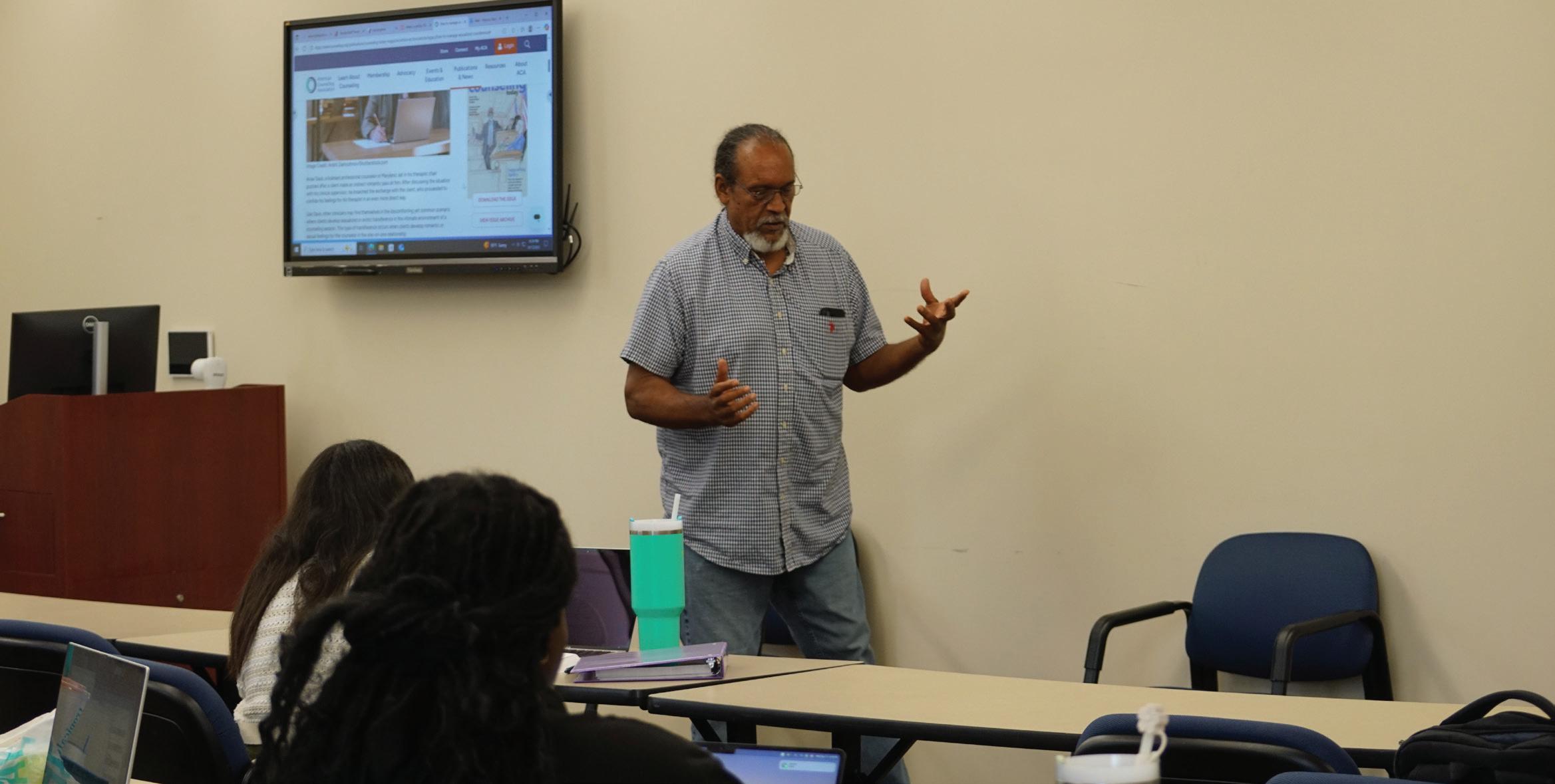
He continued to work at 12&12, and he continued to enjoy school. One day, Dr. Mary Ramey, an adjunct professor in the rehabilitation counseling program, kicked her shoes off in the middle of class and sat on a table. That behavior baffled Herron, who had always thought of academics as more formal and aloof. But Dr. Ramey seemed normal.
“It just sounds so strange, but that’s what it was to me,” Herron said. “And she looked right at me on that table and said, ‘You could be (a doctor) if you want to.’ And that’s the night it started. She inspired me.”
After that class, Herron contemplated pursuing his doctorate for weeks until one night, he realized that if he wanted to do it, he couldn’t wait.
The day after making that decision, he told Dr. Sassin about his new goal. Having taught and advised Herron for almost four years, Dr. Sassin was supportive of his plan. He helped Herron connect with faculty at the University of Arkansas, and after graduating with his master’s from LU in 2013, Herron enrolled in the University of Arkansas’ doctoral program in counselor education and supervision.
Herron went to school part time, making the two-hour drive to Fayetteville twice a week. It was difficult, and he even ended up sleeping in his car some nights, but he persevered. In 2017, he officially earned his professional counseling license and began working on his dissertation with Dr. Ramey as his dissertation committee chair.
Unbeknownst to Herron, other LU faculty had been keeping track of his progress throughout his doctoral program, too. In 2017, a faculty position opened in the LU-Tulsa rehabilitation counseling program, and Dr. Phillip Lewis reached out to Herron to invite him to apply.
“He had already gained his CRC and his LPC, which is a Certified Rehabilitation Counselor and a Licensed Professional Counselor,” said Dr. Lewis, the graduate coordinator for the rehabilitation counseling program at LU-Tulsa. “So, it was a perfect fit for me to bring Dr. Herron in to fulfill that role, because I didn’t lose anything. I just kind of transitioned, and I didn’t have to worry about a person not having the credentials.”
Dr. Herron had never imagined he would become a teacher, but the opportunity to come back to Dear Langston was too good to pass up. He has thrived in the role.
Dr. Herron’s teaching style draws a lot on his own life experiences. As someone who has received counseling, administered counseling and studied counseling extensively, he brings invaluable insights into the classroom. His classes are often filled with lively discussions, and students walk away feeling like they’ve learned.
As both a friend and supervisor, Dr. Lewis loves working with Dr. Herron. According to Dr. Lewis, Dr. Herron’s unwavering positive attitude often lifts the spirits of the whole office.
“He’s been an excellent colleague, and to be honest with you, I don’t think I could’ve found better,” Dr. Lewis said. “Him working here, he’s a product of this program. He’s homegrown, you know. And I think it’s a blessing to kind of work your way back home sometimes.”
After so many years of struggling with feelings of dissatisfaction in his life, Dr. Herron is proud to say he loves his job. He has found a balance between work and his family, and all eight of his dimensions of wellness are being fulfilled.
When he was a young man, he never could have guessed where he’d be today. He loves teaching because it allows him to pass down the mentorship that he, too, received at LU, and he feels like he’s giving back to his community. Now that he has found his place in the world, he has no plans to slow down any time soon.
“I would say to young people, old people, it’s never too late,” Dr. Herron said. “If you look at all the possible jobs out there, there is a job for you that you can be passionate about, that you can enjoy doing. So don’t give up. Stay encouraged. Have some faith and trust yourself.”
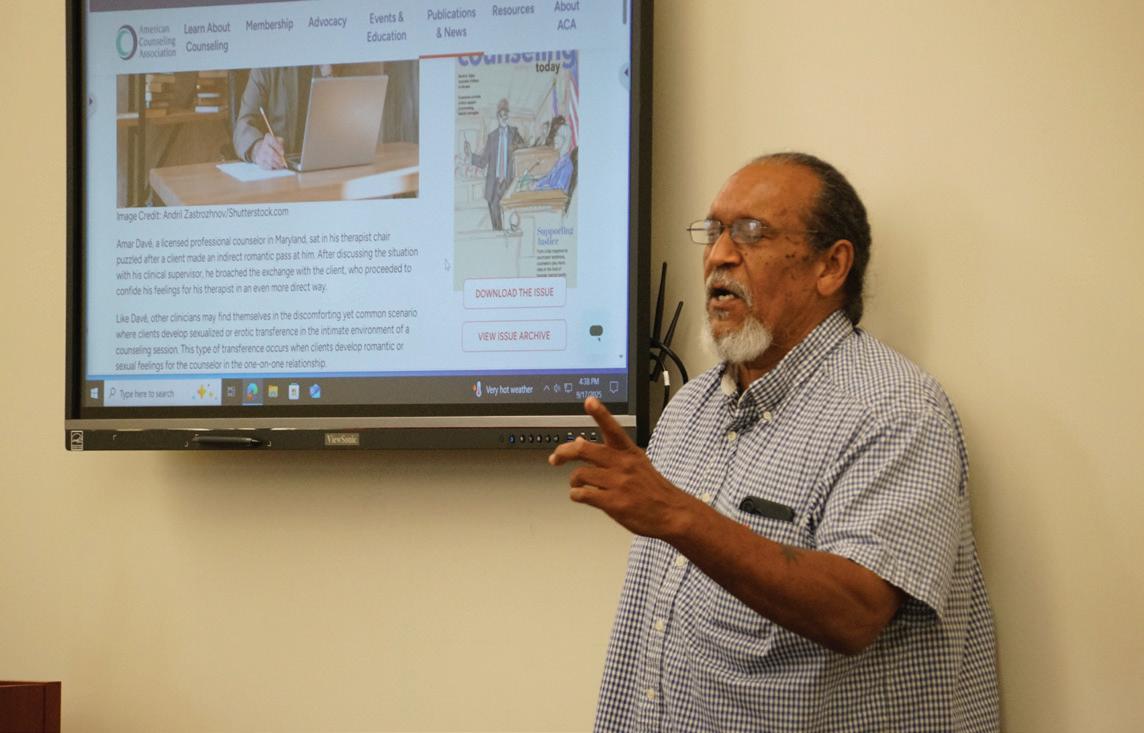
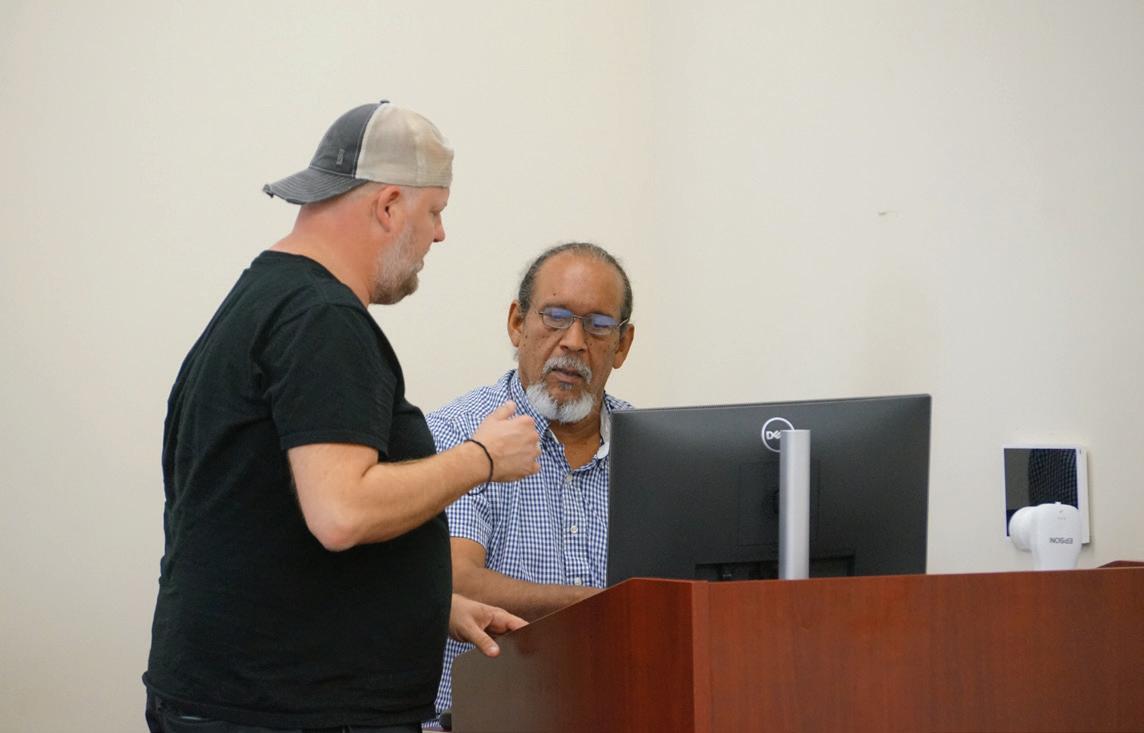

‘E ROAR IS PRODUCED BY THE LANGSTON UNIVERSITY OFFICE OF PUBLIC RELATIONS
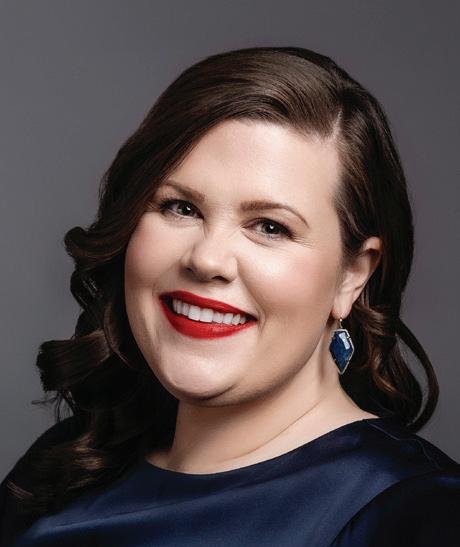

Theresa Powell Vice President for Operations
want to be featured in next month's issue?
SEND US YOUR NEWS:
If you have any accomplishments or upcoming events in your department and you want them publicized, please send to the LU Office of Public Relations via the online project request form found at www.langston.edu


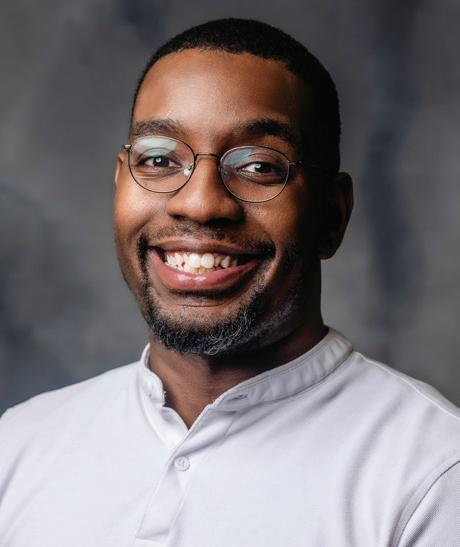
sheets Director of Public Relations
Assistant Director of Communications Editor-in-Chief
Media Relations Specialist
Contributing Editor
Senior Graphic Designer/Photographer
Design and Layout
